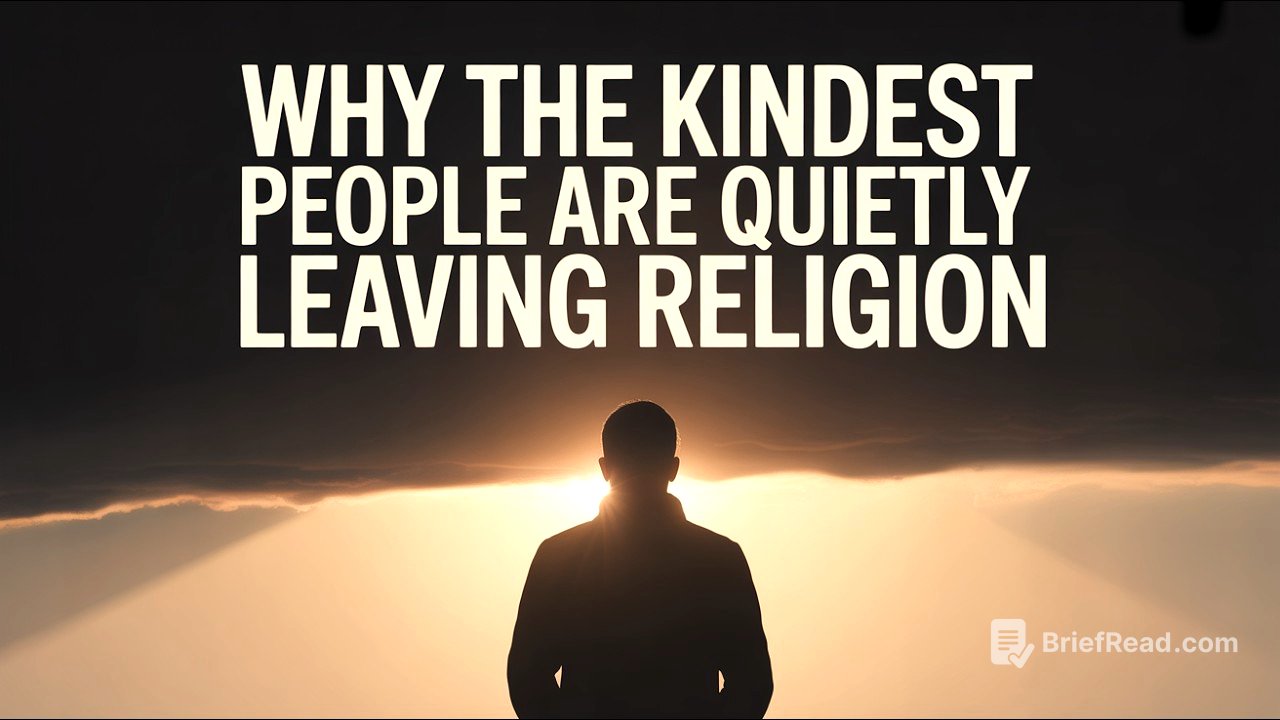TLDR;
This video explores why kind people sometimes leave religion, focusing on the contradictions they perceive between religious teachings and their personal values. It highlights that their departure is often driven by a desire to live more authentically and ethically, rather than a rejection of morality itself. The video emphasizes that kindness and morality can thrive independently of religious belief, and that those who leave often find new ways to express their values and contribute to the world.
- Kindness can lead people away from religion due to contradictions between values and religious practices.
- Leaving religion is often a refinement of morality, not an abandonment of it.
- People who leave may experience loss but gain authenticity and autonomy.
The Crossroads of Belief and Identity [0:02]
The video starts by addressing the common surprise or confusion that arises when compassionate individuals choose to leave their faith. It challenges the assumption that religion is the sole source of kindness, arguing that for many, it is their inherent kindness that leads them to question and ultimately step away from religious institutions. This departure isn't typically a rebellious act, but rather a consequence of honestly confronting the contradictions they observe within their faith.
The Accumulation of Contradictions [1:01]
Over time, individuals with sensitive consciences notice contradictions within their religious environments. These can include faiths that preach love but exclude certain groups, doctrines that demand unquestioning submission while praising humility, and institutions that advocate forgiveness but punish doubt. These contradictions become painful and challenge the individual's ability to reconcile their values with their faith's teachings.
The Disconnect Between Promises and Reality [1:48]
Many individuals are initially drawn to religion by its promises of community, purpose, and moral grounding. However, a point is reached where the gap between these promises and the reality of religious institutions becomes too wide. They witness injustice, the overlooking of abuses, and the marginalization of entire groups, often justified as "God's will." This creates a moral conflict for those who genuinely care about others, leading to a sense of betrayal and making prayer feel hollow.
Kindness and Intellectual Honesty as Risks [2:45]
Kindness, combined with intellectual honesty, can be a dangerous mix within rigid religious systems. This is because kindness compels individuals to speak out against harm and suffering, which can be perceived as a threat to the institution's image. In communities where doubt is seen as weakness and conformity is valued over compassion, kind individuals may feel isolated and torn between their heart and their faith.
The Unraveling of Dogma [3:32]
Personal experiences often challenge and unravel religious dogma. For example, someone taught that certain groups, like gay people, are living in sin may find their stereotypes shattered upon meeting and befriending individuals from those groups. This leads to the uncomfortable realization that they were taught to withhold love under the guise of righteousness, causing a shift from following rules to following their conscience.
The Weight of Contradictions and the Expansion of Kindness [4:37]
The weight of trying to reconcile contradictions within their faith eventually becomes too much for some. Excuses wear thin, and they find themselves at the edge, unsure of where they belong. However, their kindness doesn't disappear; it expands, no longer limited by religious texts or worldviews. Their empathy becomes direct, human, and unrestricted, allowing them to move through the world with respect, humility, and deep concern for others.
Moral and Ethical Concerns as a Major Reason for Disaffiliation [5:21]
Studies show that a growing number of people who leave religion cite moral and ethical concerns as a major reason. They view religious groups as too judgmental, hypocritical, or focused on power and politics. This isn't a rejection of goodness but a rejection of systems that claim moral authority while causing harm. Those who leave are often refining their morality, removing transactional, tribal, or fear-based elements and focusing on what truly helps people.
The Social and Spiritual Transition [6:18]
Leaving faith is not an easy transition, as it can have social, cultural, and economic consequences, including the loss of family, friends, and belonging. However, some of the kindest people make this leap because they care too much to keep pretending. They can no longer defend belief systems that treat women as second-class citizens, dismiss mental health struggles, or view tragedy as divine punishment. Their compassion outgrows their doctrine, and their conscience outpaces their creed.
The Honesty of Doubt and the Freedom of Kindness [7:08]
Some who leave religion remain quiet about their shift to avoid being misunderstood or having their kindness weaponized against them. They may be asked how they could abandon something that gave them so much or abandon the truth. However, truth to them means being honest, even when it's uncomfortable. Stepping away from religion gives them more space to live out their values, free from the tension between belief and feeling. They can simply be kind without agenda, eternal reward, or fear of punishment.
Building Meaning Outside of Religion [9:04]
While those who leave religion may still struggle with meaning and purpose, they now build their meaning themselves, grounded in relationships, curiosity, art, science, and lived experience. Their sense of wonder expands, becoming less about a divine plan and more about the incredible reality of existence itself. Morality matures, becoming less about obeying rules and more about asking better questions about who is harmed, who is helped, and what improves life for others.
The Source of Kindness and the Rejection of Harmful Doctrines [11:41]
Kindness often comes from something deeper than belief, such as temperament, empathy, and life experience. Religion may shape how kindness is expressed, but it doesn't invent or own it. When doctrine conflicts with this inner compass, something has to give. Individuals may reject texts that speak of stoning and slavery or leaders who protect power over people, realizing that being kind is about how you treat others, especially when no one is telling you what to do.
New Communities and the Growth of Kindness [12:38]
Some find new communities outside of religion, such as ethical societies or volunteer groups, while others go it alone to rebuild trust after religious loss. Their kindness often grows, becoming more patient with other people's pain, more open to different stories, and more interested in understanding. They carry a quiet grace, demonstrating a calm strength that comes from questioning everything and still striving to do good.
The Authenticity of Chosen Compassion [13:40]
While some may view leaving religion as a collapse of morality, many who leave are more active in their communities than before, donating, volunteering, and advocating out of genuine solidarity. This shift from obligation to authenticity matters, as compassion becomes a chosen act rather than a commanded one. They miss the community and shared rituals of religion but recognize that connection, beauty, and transcendence aren't owned by religion.
The Process of Filtering and Rebuilding [15:10]
The kindest people who leave religion hold on to what's still true for them, such as songs and moments of reverence, while letting go of what no longer matches their values. This process of filtering out the harmful and holding on to the good takes emotional maturity and is often done with care and grief. They fill the space left by religion with a new kind of meaning that is built, not inherited, and found in honest conversations and life decisions that no longer fit a narrow mold.
Embracing Uncertainty and Ethical Evolution [16:18]
Many who leave religion are more comfortable with uncertainty than those they left behind, accepting that they don't have all the answers. They focus on making the known world more just, humane, and beautiful, helping others because they see suffering and feel compelled to act. This ethical evolution involves choosing kindness without permission and living with integrity because it matters, taking full responsibility for their choices without the promise of reward or fear of punishment.
The Quiet Evidence of Morality Beyond Religion [18:15]
Those who leave religion stand as quiet evidence that morality isn't owned by religion, demonstrating that deep compassion can grow where faith once stood and critical thinking now flourishes. Their stories prove that people are capable of choosing love, justice, and empathy, even when it's hard. Their kindness is shaped by the decision to care anyway, showing up with integrity and living by their own convictions, even if it means walking alone.
The Honesty of Saying "I Don't Know" [19:11]
While some may struggle with guilt or drift in and out of belief, there's a deeper honesty in saying "I don't know" or "I don't believe this." This alignment of outer and inner lives is not rebellion but a way to stop betraying themselves. They learn to sit with tension, hold space for others' experiences, ask better questions, and be okay with no easy answers. This is not a loss of purpose but the beginning of wisdom.
Walking Towards a Different Kind of Meaning [20:43]
When kind people leave religion, they're walking toward a different kind of meaning, one that's harder to define but more grounded. They stop separating the sacred from the ordinary, finding reverence in everyday moments and human connections. They pay attention to this life, becoming thoughtful, compassionate, ethical, and courageous without the need to believe they're being watched or judged.
Freestanding Virtue and the Future of Morality [21:50]
The shift from faith-based virtue to freestanding virtue is significant, especially as religious affiliation declines. The future of morality is being lived out by those who walked away with clarity, stopped believing in a god but never stopped believing in people. They live ethical, full, and meaningful lives without metaphysical permission, challenging old narratives about religion being the sole source of goodness.
Authenticity, Autonomy, and Clarity [22:57]
Those who leave religion still face judgment and loss but gain authenticity, autonomy, and clarity. They want to do good with both eyes open, making the honest human choice to be decent in a complicated world. This requires no divine command, just the willingness to show up with integrity, kindness, and the courage to live by their own hard-earned convictions, even if it means walking alone.









